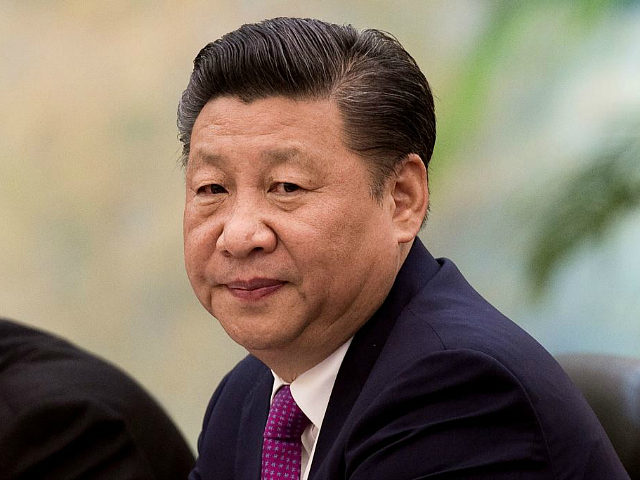The Chinese state news agency Xinhua is promoting statements by President Xi Jinping made last month demanding a “new trend toward socialist family values” in China as the Communist Party faces a 2017 teeming with new challenges from separatist groups, religious minorities, and even Maoists who reject Xi’s autocratic capitalist reforms.
Xi made the comments at a conference “to honor model families” in December, according to Xinhua, defining “socialist family values” as “love for the nation, family and one another, devotion to progress and kindness, and mutual growth and sharing.” His New Year’s Eve address appeared to promote more of the same, demanding the Chinese people “work harder” to aid the Communist Party’s progress both nationally and globally.
“As long as our 1.3 billion-plus people are pulled together for a common cause, as long as the Party stands together with the people and we roll up our sleeves to work harder, we will surely succeed in a Long March of our generation,” Xi reportedly said in his address.
He made clear that the values he seeks to see Chinese families promote are indivisible from Communist Party edicts, reminding listeners that “law is virtue put down in words, and virtue is law borne in people’s hearts.” Xi reportedly urged “fostering a belief in law, the rule of law and rules, and guiding people to voluntarily assume their statutory duties, as well as responsibilities for society and family.”
The Chinese Communist Party propaganda outlet The People’s Daily reported that Chinese citizens online “responded enthusiastically to President Xi Jinping’s New Year’s address, equally impressed by the content and inspirational phrasing of the speech.”
The Chinese media outlets’ emphasis on family values are contrasted with Western-style popular culture on the pages of the Global Times, another English-language propaganda outlet. While China’s president has repeatedly dwelled on “socialist family values” in recent speeches, the Times has decried reality show participants and celebrity divorcees as indicative of a trend of immaturity among young Chinese people.
The major culprit appears to be a reality show called Chinese-Style Blind Dating, where parents get a say in whether a contestant’s romantic prospects are good for them. The Times complains that too many men on the show are “not looking for true love or their other half, but a mother” and cites an “expert” — Chinese psychoanalyst Wu Zhihong, author of Nation of Giant Infants — who protests that “the majority” of Chinese people “are stuck at the level of a 6-month-old infant.”
Unfortunately for Xi, many of those who are perturbed by the comfortable lives of China’s elite — the “giant infants” likely targeted by the call for “socialist family values” — are Maoists who blame Xi and his embrace of globalist elitism for the devolution in Communist loyalties in China. These Communists, dubbed “Neo-Maoists” or the “New Left,” see Xi as a force perverting true Communism to allow business to flourish in the nation.
“Chairman Mao was a truly great man but this is not the country he dreamt of, this is not real communism,” an unnamed university professor who identifies with the movement told the Financial Times in September. “The economy today is dominated by monopoly industries controlled by the children of senior officials. The current government, led by Xi Jinping, is very bad.”
The Financial Times cites experts who suspect that neo-Maoism, largely driven by an educational system that promotes cult worship of Mao without discussing the tens of millions killed by his regime, “would probably win a general election in China today, should free elections ever be allowed.” CNBC describes neo-Maoism as a “growing populist movement” that may threaten Xi’s rule in the near future.
Maoists are but one on the long list of enemies Xi has cultivated as head of the Party. Entering 2017, Beijing faces the growing threat of separatist movements emboldened, in part, by the changing of the guard at the White House. Paramount among these are Taiwan’s Democratic Progressive Party (DPP), led by President Tsai Ing-wen, expected to visit the United States briefly later this month.
Tsai enraged China in November by calling President-elect Donald Trump and congratulating him on his election victory. Beijing repeatedly condemned Trump’s decision to accept the reportedly benign call, a move apparently designed to curb not only Tsai but anti-Beijing leaders in Hong Kong, Tibet, and Xinjiang, all regions seeking to escape the Communist Party on the east coast.
Xi has also presided over an astronomical growth in the number of Chinese Christians. China now produces more Bibles than anywhere in the world and is experiencing a boom in underground “house” churches unencumbered by Beijing’s Communist agenda. Xi has responded by cracking down on house churches, which tend to be Protestant, and pushing away from the Vatican.
Last week, China’s Catholic Church, controlled by Beijing, officially split from Rome. “Sticking to the principle of independence and self-governance as well as a system of national congresses embodies the self-esteem and confidence of the Catholic Church in China,” the severance statement read. Among Beijing’s objections against the Vatican is its recognition of the sovereignty of Taiwan.

COMMENTS
Please let us know if you're having issues with commenting.